
Photo: Marcus McDonald
Photo: Photo: Marcus McDonald
If you have a beloved dog keeping you company at home, you probably want to spoil them, or if you’re like me, you want to teach them to play the piano — but either way, you’ll need to stock up on dog treats. And taking a trip down the virtual pet aisle for treats can be overwhelming: As a caring dog owner, you want to find something your pup will love, but you want to keep them healthy. And from subscription treat boxes to freeze-dried organ meats to sustainable insect chews, there are more options than ever before.
To help narrow down the choices, we asked ten experts — including veterinarians, animal nutritionists, canine-behavior specialists, dog trainers, and some Strategist dog parents — about the treats they recommend or feed to their own dogs. Just remember that “treats” don’t equal a balanced meal and that eating too many high-calorie snacks will actively harm your dog. “Treat calories should only account for a maximum of 10 percent of total calorie intake,” says board-certified veterinary nutritionist Dr. Lindsey Bullen. “Otherwise, they could unbalance the diet.” For example, if your dog consumes 1,000 calories per day, “they should get no more than 100 calories in the form of treats.” An easy hack is to use a portion of your dog’s regular food as a treat when you’re walking or training them rather than a specialized, high-calorie product. Of course, Bullen says, “this can be easy in pets that are not picky but challenging in those with a refined palate.”
With that said, we’ve compiled this list of ten treats for almost any dog — from easy-to-carry snacks for picky eaters to ones that can help teach an old dog new tricks and long-lasting chews for teething puppies. To make buying them online as effortless as possible, all the expert-approved and Strategist-tested recommendations below are listed in a simple table of contents — just click any of the links to jump straight to a specific kind of treat or read on to find out what we looked for when making our picks.
Dog treats are a great training tool and a way to reward your pet for good behavior (or for being real cute). But they should provide balanced nutrition without a lot of cheap fillers or synthetic ingredients, both of which can cause inflammation and an upset stomach. The quickest way to tell the difference between treats that are good for your pup and treats that are just well-marketed junk food is to read the list of ingredients. Ideally, everything on that list should be a recognizable food item like chicken breast, beef liver, or sweet potato. A shorter list of ingredients usually points to a less processed, more nutritious treat, while lots of unpronounceable ingredients or meat and grain meals or by-products can mean the treat is made from questionable stuff. Additionally, dog foods with a high proportion of peas, lentils, other legumes, or potatoes in various forms have been linked to a small but not insignificant number of cases of canine dilated cardiomyopathy. While there isn’t any clear information about dog treats with these ingredients — most likely the frequency of eating such ingredients makes a big difference — we did keep an eye out for them when creating this list. The FDA is still looking into the science behind their potential risks, but for now, talk to your vet if you’re worried.
As the owner of a small breed, I gravitate toward smaller, chewier treats for my dog, Uli, who doesn’t have the chompers to take on hard, crunchy treats. And because the size of her bite is smaller than that of most dogs, little treats are more convenient. I still want to give her treats that encourage her to chew because it’s beneficial for her teeth and keeps her busy, but I look for very thin or flexible jerky treats to accommodate her smaller build and bite. When buying treats online, though, a lot of details about the size of dog treats are obscured. So no matter what kind of dog you have, reading reviews and talking to dog-owning friends about their dogs’ preferences can help you make informed decisions. And since size and texture preferences vary widely from dog to dog (and dog owner to dog owner), I’ve noted details about both for each recommendation below.
When all you’re thinking about is making your pup happy, the cost of dog treats can sneak up on you real fast. And if you’re shopping for treats online, packaging can be even more deceiving. Some treats are more expensive because they are made with higher-quality ingredients, but you’ll definitely want to pay attention to the package size. Think about how many treats you’ll give your dog each day and how long each one will last. For example, a bully stick is more expensive per piece because it will last (and entertain your dog) longer than a dime-size liver cracker. To help you parse this out, we’ve listed the price per ounce in each of the treat descriptions below.
Your dog may occasionally turn up their nose at a new treat regardless of its great ingredients and stellar review from your best friend’s dog. So while I can’t predict the exact treats that will satisfy and motivate your dog, I can tell you which treats drive Uli absolutely wild (in a good way). And each time someone on the Strategist team tests one of these treats on their dog, we’ll make a note of that too. Some dogs have specific protein or flavor preferences that will draw them to one treat and turn them off another. We’ve listed the flavors available for each treat, so you can pick the right one based on your furry friend’s preferences.
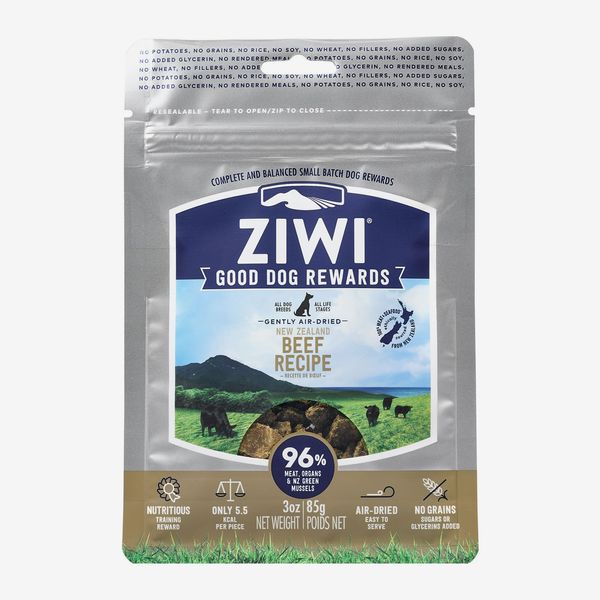
Photo: retailer
Nutrition: First eight ingredients are meat or organs | Size and texture: Jerkylike texture that breaks apart easily | Cost: Approx. $3.93 per ounce | Flavor: Also available in lamb and venison
“Ziwi treats are 96 percent meat, which means my dogs aren’t filling up on candy,” says Nicole Ellis, a certified professional dog trainer with Rover. Because most of the brand’s treats are single protein, they’re a good option for “dogs that may have sensitive tummies and allergies,” she adds. They are grain free with no added carbohydrates or fillers, and they come in a variety of proteins. “I very rarely meet a dog that doesn’t love them,” she says.
Strategist junior writer Brenley Goertzen tested Ziwi with her 6-year-old Australian shepherd mix and 3-year-old Great Dane and says the treats’ strong, meaty aroma can hold the attention of her dogs for an entire 30 minutes of obedience training, even in busy locations like public parks. At home, Goertzen says the treats have also helped maintain good behavior and faster responses to commands. Plus, the slight softness of each strip makes them easier for Goertzen’s pups to consume, as opposed to crunchier treats, which can crumble and distract them from their next training cue.
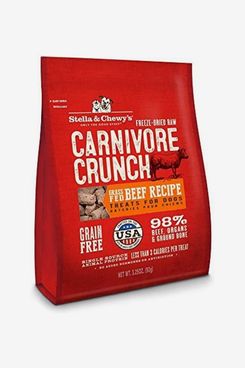
Nutrition: First six ingredients are meat or organs | Size and texture: Small chews that are easily crumbled | Cost: Approx. $4.62 per ounce | Flavor: Also available in chicken, duck, and turkey
Royah Nuñez, a dog trainer and the founder of Quing Canine, recommends these freeze-dried raw treats for dogs who are known to be picky eaters. Like the brand’s vet-approved dog food and the Ziwi treats above, each Carnivore Crunch flavor is made from a single source of protein. Nuñez considers them a high-value option, because they’re nutrient-dense, but warns that they should be used sparingly, as “it’s like catnip for dogs.” The meaty flavors are ideal for getting a pup’s attention — especially when commands are more challenging and during house training. “If I give them Stella & Chewy’s Carnivore Crunch, they’re like, ‘Oh yeah, yeah, I get it. I use the bathroom outside,’” Nuñez says.
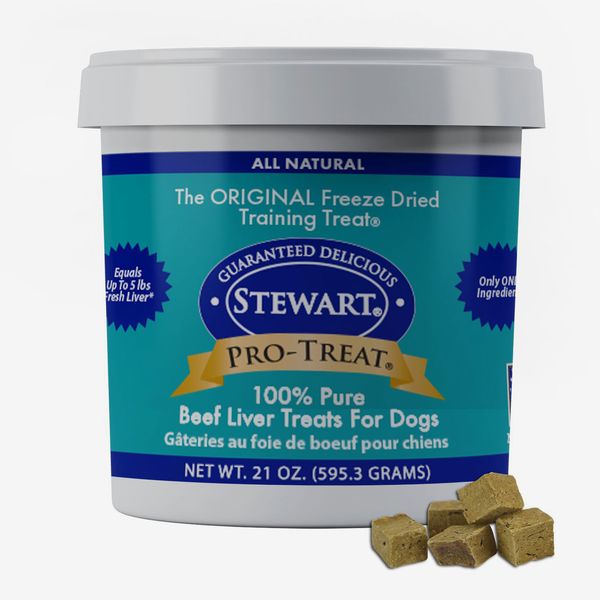
Photo: retailer
Nutrition: Freeze-dried beef liver | Size and texture: Dense chunks may need crumbling for small dogs | Cost: Approx. $1.90 per ounce (non-sale) | Flavor: Also available in chicken liver, turkey liver, duck liver, lamb liver, and salmon
“Dehydrated meat products are another one of my favorites,” says Pure Paws Veterinary Care owner Dr. Stephanie Liff, who name-checked this line of treats from Stewart as one to try. “These can be larger in size, so they need to be crumbled, but they are universally liked, for the most part, which is helpful when you want a really special treat.” Because they have few ingredients and come in multiple flavors, they can be a good option for dogs with allergies, she adds. While these are less expensive and come in more flavors than our best pick overall, the fact that they are made with freeze-dried raw meat might be a turnoff for some pet parents.
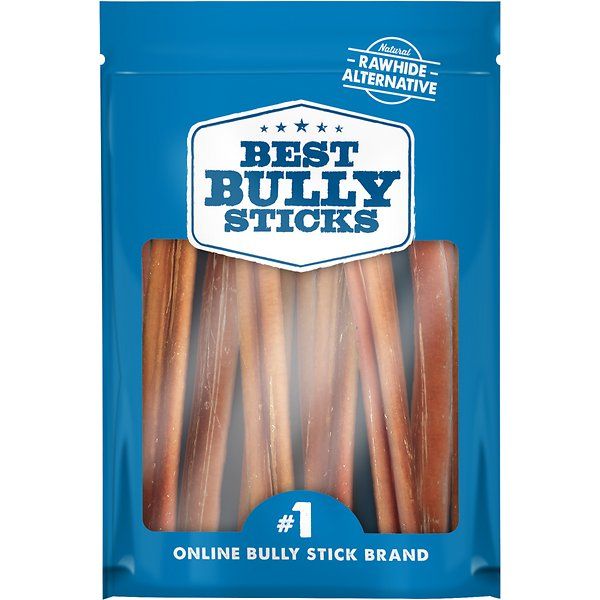
Nutrition: Beef pizzle | Size and texture: Firm but not as hard as bone or antler | Cost: Approx. $3.43 per ounce | Flavor: Beef
“Chew toys are the first line of defense when it comes to teething puppies gnawing on everything in sight,” former Strategist writer David Notis wrote in his guide to handling a teething puppy. Of all the treats a young dog can gnaw on, Notis discovered that bully sticks — which are made from a bull’s penis and are sort of like a toy and a treat in one — are the best bet for keeping a puppy occupied. And they are rich in nutrients. While you can give antlers or bones to fully grown dogs, both of those options are too hard for puppies and can chip their baby teeth, Notis says. Bully sticks, meanwhile, are “fully digestible, and chewing them is good for the teeth and gums,” explains Randy Klein of Whiskers Holistic Pet Care. Annie Grossman of New York’s School for the Dogs training center loves the Best Bully Sticks brand because its bully sticks are made in the U.S. She recommends using a bully-stick holder because “you don’t want them to swallow it, and the smaller it gets, the better the chance that can happen.”
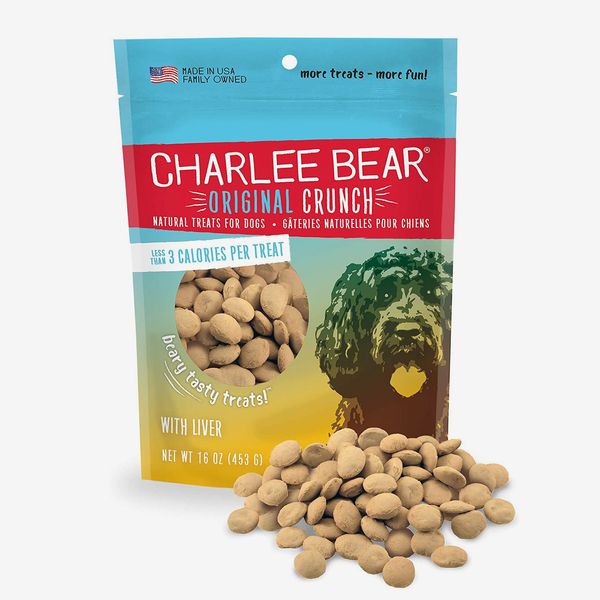

Photo: retailer
Nutrition: Wheat flour, poultry liver, salt, garlic powder, and mixed tocopherols | Size and texture: Thin, crunchy, hollow, and small | Cost: Approx. $0.59 per ounce (non-sale price) | Flavor: Also available in cheese and egg, turkey liver, and chicken and vegetable
If you’re using treats as a reward system for training your dog, choosing the best ones gets a little more complicated. According to Sarah Fraser, the co-founder of Instinct Dog Behavior & Training, “Not all treats are created equal even for dogs who love food.” She suggests thinking of treats as falling into three categories: low value, medium value, and high value. “Low-value treats are great for rewarding skills your dog already knows in low-distraction settings,” she explains. Fraser suggests these Charlee Bear Original Crunch Natural Dog Treats, which she considers low value, as a “simple, low-cost, and low-calorie treat that many dogs enjoy.” Nuñez prefers these for low-stakes training, because they fit in her pocket and their crackerlike texture means they don’t crumble easily. As a younger dog, Uli loved Charlee Bear treats, but now she’s less of a fan. That said, they are great for small dogs because they are hollow and easy to crunch.
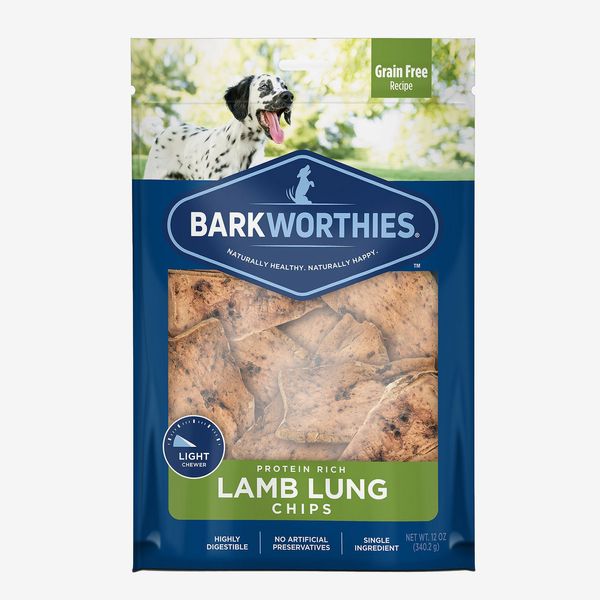
Photo: retailer
Nutrition: Lamb lung | Size and texture: Thick, strong-smelling pieces may be too dense for small or senior dogs | Cost: Approx. $2.32 per ounce | Flavor: Lamb
Fraser told us, “High-value treats are great for rewarding skills in high-distraction situations, for rewarding super-important skills like coming when called, and for behavior modification where we are trying to positively change a dog’s emotional and physiological response to stressful triggers.” She loves using Barkworthies Lamb Lung Treats as a high-value reward because, unlike a lot of higher-value treats like fresh chicken or cheese, “lamb lung isn’t perishable, meaning you can keep it stocked in a treat jar or your treat pouch without worrying about it going bad.”
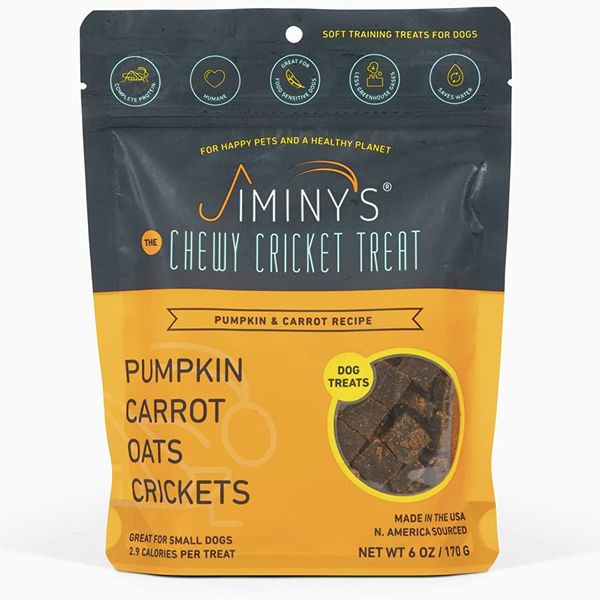

Nutrition: Pumpkin, carrot, oats, and cricket protein | Size and texture: Small and squishy with a strong smell | Cost: Approx. $1.50 per ounce | Flavor: Pumpkin and cricket
Cricket treats are higher in protein and more nutrient dense than beef or chicken treats, and they require fewer resources like land, water, and energy to raise (so they result in much lower carbon emissions), plus Uli is obsessed with them. They are among the only treats she actively seeks out on the shelf in my kitchen, barking and pawing at the bag. Ellis is a fan: “If you have a dog with a ton of allergies but want a high amount of nutrients,” she says, “you might want to consider a cricket protein treat” like Jiminy’s — though she notes that “not all dogs love them.” Ironically enough, Ellis’s picky eater loves these, but her other dog that will eat almost anything “won’t touch them.”
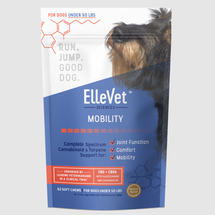
Nutrition: Complete Spectrum Proprietary Hemp Oil, glucosamine, and chondroitin | Size and texture: Small soft chews that can easily be broken in half, two sizes/doses for big and small dogs | Cost: Approx. $9.19 per ounce | Flavor: Peanut butter
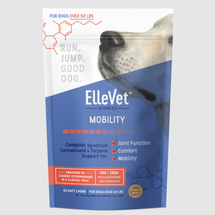
Liff told us her parents have an older, arthritic golden retriever who takes ElleVet CBD chews, which she says have significantly improved his mobility. She is one of three vets who recommended the treats to us when we investigated CBD for dogs, with all of them saying ElleVet is the gold-standard brand in the space. The company conducted testing of its CBD chews with Cornell University, and the results showed 80 percent improvement in reducing pain and increasing mobility in dogs with severe joint issues. The treats come in 62-piece packages, and they’re available in two sizes/doses for small-breed dogs under 50 pounds (which contain 20 milligrams of cannabinoids per chew) and large-breed dogs over 50 pounds (which contain 30 milligrams per chew), both of which are peanut-butter flavored. If you are uncertain about which dose to select for your specific dog, ElleVet’s website has helpful advice and calculations based on weight.
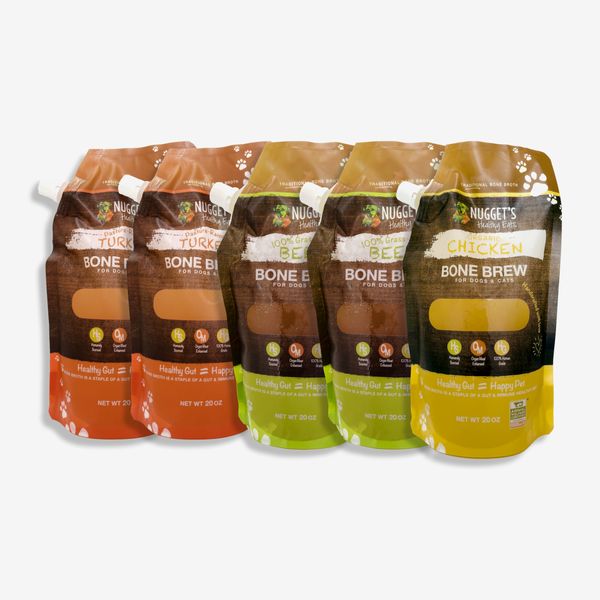
Nutrition: Made with five ingredients that are safe for human consumption including broth from marrow and knuckle bones | Size and texture: Liquid that can be used as a snack or food topper | Cost: Approx. $3.25 per ounce | Flavor: Beef, chicken, or turkey
As Uli and I both get older, I have been looking for ways to supplement our diets with protein and other important nutrients. We have not tried this human-grade bone broth yet, but I’m excited that it exists. Should you want to share a bone broth with your pup, this one from Nugget’s Healthy Eats, which is safe for both people and pets and shipped frozen for freshness, is your very best bet. Tazz Latifi, a certified pet nutritionist and retail consultant, calls Nugget’s Healthy Eats “a really amazing brand” that is unusually dedicated to sourcing high-quality, organic, pasture-raised meats for its broth and jerky products. “How things are sourced really matters,” she emphasizes. “There are brands that dogs love, but most dogs will eat poop if you hand it to them.” She’s had a sip of the broth and liked its taste despite being a vegetarian.
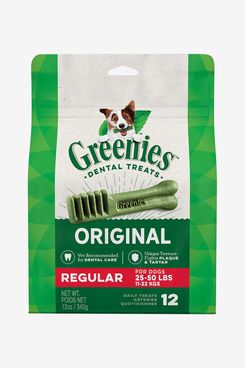

Nutrition: Made with a long list of ingredients including wheat flour, glycerin, wheat gluten, gelatin, and various vitamins and minerals | Size and texture: Chewy texture, four sizes based on the size of your dog | Cost: Approx. $1.66 per ounce (non-sale price) | Flavor: Sweet potato, blueberry, or fresh
Brushing Uli’s teeth is nearly impossible, and like many small breed dogs, she is prone to dental issues. So I use Greenies as a supplement to dental wipes to hopefully get rid of food stuck between her teeth. While the longer ingredient list is less than inspiring, she loves playing with them, and they’re one of the few treats she actually gets into chewing for a long time. Strategist junior writer Brenley Goertzen gives these to her Australian Shepherd mix, and after consistent use (which was recommended by a vet), they’ve kicked the dog’s bad breath. Goertzen likes that the brand offers treats in different sizes based on your pet’s weight, so she can feed them to her Great Dane too. According to Dr. Sara Ochoa, a Texas-based veterinarian who specializes in small and exotic animals and consults for doglab.com, Greenies “help prevent tartar buildup and help keep teeth healthy.” They happen to be her dog’s favorite treat, she adds. When we spoke to her, Ochoa’s dog was nine years old; she told us she fed the pooch one or two Greenies a week, and she still “has almost all of her teeth.”
• Dr. Lindsey Bullen, a board-certified veterinary nutritionist
• Nicole Ellis, certified professional dog trainer with Rover
• Sarah Fraser, co-founder of Instinct Dog Behavior and Training
• Brenley Goertzen, Strategist junior writer
• Annie Grossman of the School for the Dogs training center
• Randy Klein of Whiskers Holistic Pet Care
• Tazz Latifi, certified pet nutritionist and retail consultant
• Dr. Stephanie Liff, owner of Pure Paws Veterinary Care
• Royah Nuñez, dog trainer and founder of Quing Canine
• Dr. Sara Ochoa, Texas-based veterinarian who specializes in small and exotic animals and consults for doglab.com
The Strategist is designed to surface the most useful, expert recommendations for things to buy across the vast e-commerce landscape. Some of our latest conquests include the best acne treatments, rolling luggage, pillows for side sleepers, natural anxiety remedies, and bath towels. We update links when possible, but note that deals can expire and all prices are subject to change.
:max_bytes(150000):strip_icc():focal(430x196:432x198)/patches-enormous-cat-adopted-042023-1-caddbb8938114e75acbc2e8d39545193.jpg)